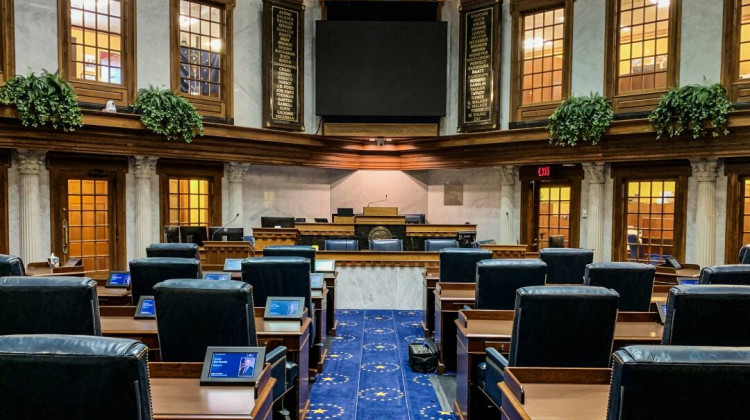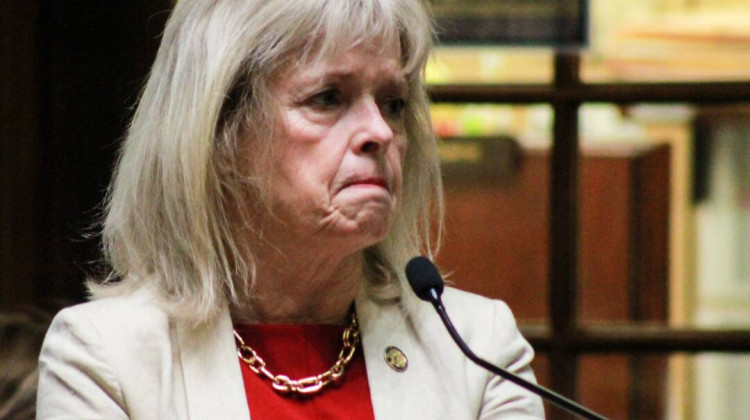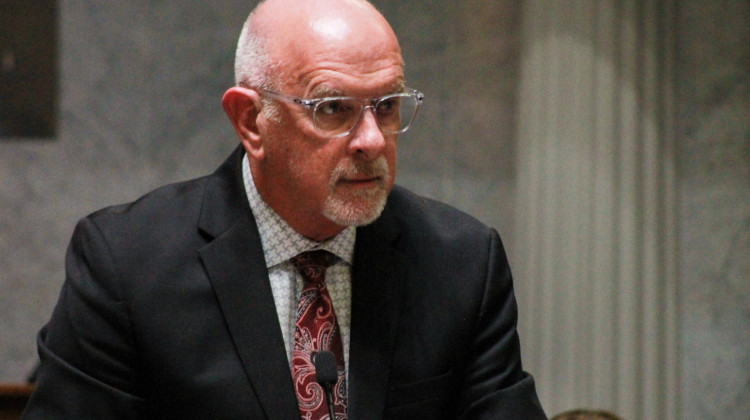
Senate Republicans largely rejected amendments to the budget bill offered by Democrats.
Brandon Smith / IPB NewsSenate Democrats proposed a series of amendments to the budget Monday that would generate more money for the state — and Republicans rejected them all.
Democrats proposed increasing Indiana's cigarette, alcohol and gaming tax rates — and, Sen. Fady Qaddoura (D-Indianapolis) said, dedicating those dollars to health programs.
"Those revenue-generating mechanisms will free up dollars — whether for mental health or for Medicaid — and we can reallocate it to public education, so that we're supporting our schools," Qaddoura said.
Republican budget architect Sen. Ryan Mishler (R-Mishawaka), in opposing the amendments, did say that all options will be on the table as the budget is finalized in the coming days.
Democrats also proposed major policy changes — including Sen. Rodney Pol Jr.'s (D-Chesterton) amendment to legalize, regulate and tax cannabis.
"Ultimately, we're not talking about encouraging use," Pol said. "We're talking about regulating what is already happening and putting that money to good use."
READ MORE: What is stopping cannabis legalization in Indiana?
Sen. Greg Goode (R-Terre Haute) said the debate over cannabis shouldn't be considered solely because the state needs money.
"I want to consult with public health officials, medical officials, researchers — especially those who work with children — and let's take a comprehensive approach," Goode said. "Let's not do it in the name of some fiscal challenge."
Join the conversation and sign up for our weekly text group: the Indiana Two-Way. Your comments and questions help us find the answers you need on statewide issues, including our project Civically, Indiana and our 2025 bill tracker.
Other rejected amendments included a tax credit for low-income housing, increased funding for child care vouchers, increasing the state income tax deduction for renters from $3,000 to $4,000 and a sales tax exemption for menstrual products.
Sen. Andrea Hunley (D-Indianapolis) said eliminating the sales tax on menstrual products — things she called "essential" — would cost Indiana about $12 million a year.
"Which is a lot to the Hunley family, but is not a lot when we're talking about a $45 billion budget," Hunley said.
But Sen. Liz Brown (R-Fort Wayne) said lots of things become essentials for families.
"Whether it's a new pair of sneakers, making sure your kids have soccer cleats, making sure that you can pay for the jersey — whatever it is, all those items that you purchase become essential," Brown said.
Hunley likened her amendment to existing Indiana policy, which exempts child diapers and infant formula from sales tax.
Brown said those exemptions were difficult decisions made during the 2022 abortion ban debate and were aimed at helping new mothers.
Democrats offered 61 amendments in total, several of which were aimed at education. Those included provisions to increase overall K-12 funding, require some financial transparency from private schools that receive taxpayer dollars and dramatically increase the tax credit teachers can get for spending money on school supplies out of their own pockets.
Sen. J.D. Ford (D-Indianapolis) said Republicans rejecting Democrats' amendments on education policy sent a message.
"We've watched bill after bill come through this chamber that adds pressure, layers on mandates, chips away at the public trust in our education system," Ford said. "We've seen proposals that push teachers out of our classrooms, sow division in school communities and shift resources away from students. We owe it to them to do better."
Speaking to the Democrats' amendments as a whole, Mishler noted that this budget is particularly tight.
"So, the request from your amendments was $1.6 billion," Mishler said. "The revenue from your tax increases were $580 million. So, I still think it was a little short."
Lawmakers will receive a new revenue forecast Wednesday that will provide budget projections used to produce the final version of the budget.
Brandon is our Statehouse bureau chief. Contact him at bsmith@ipbs.org or follow him on Twitter at @brandonjsmith5.
 DONATE
DONATE






 Support WFYI. We can't do it without you.
Support WFYI. We can't do it without you.